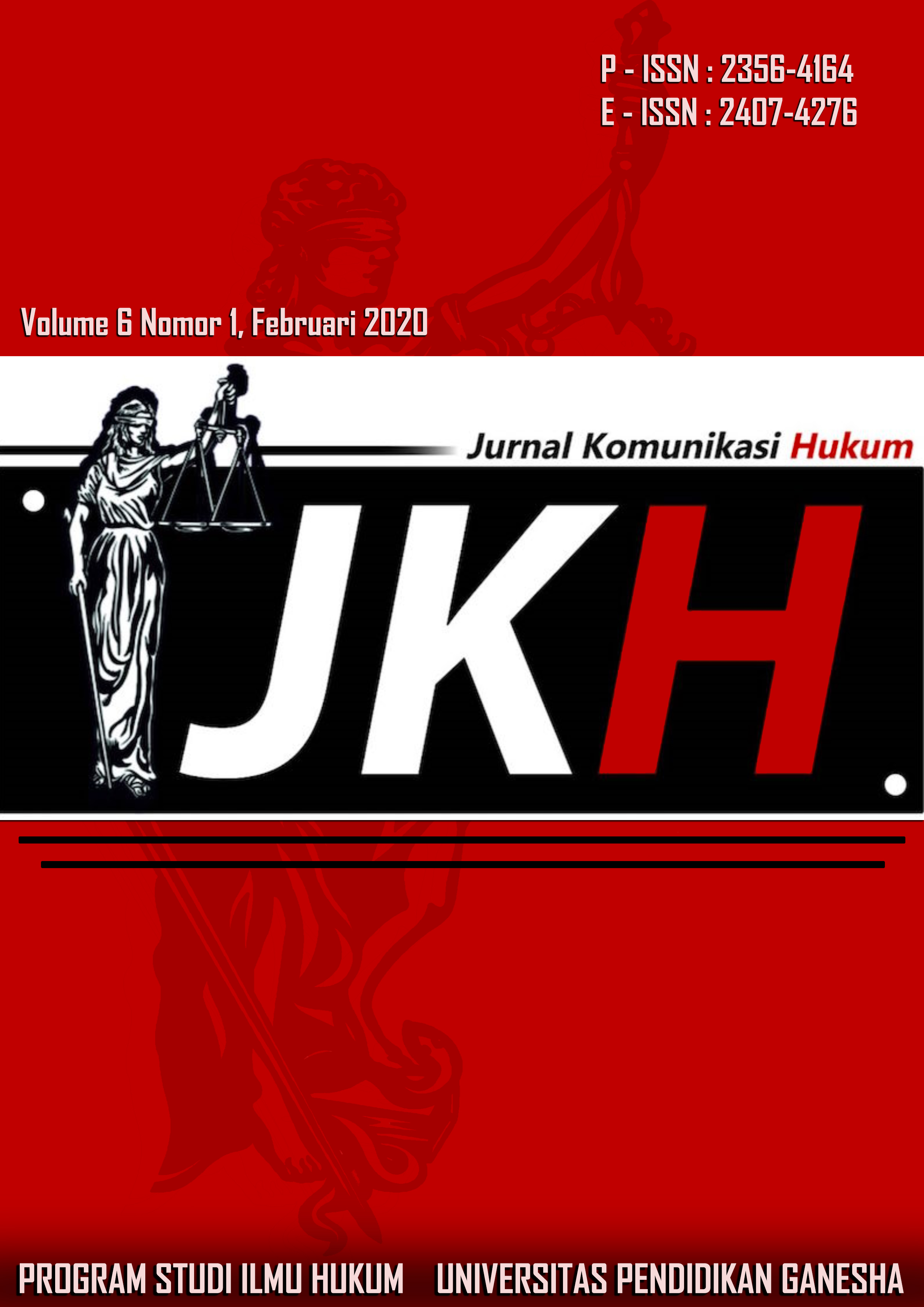PERBANDINGAN ANTARA KONSEP FIKTIF NEGATIF DALAM UU 5 TAHUN 1986 TENTANG PERADILAN TATA USAHA NEGARA DENGAN KONSEP FIKTIF POSITIF DALAM UU 30 TAHUN 2014 TENTANG ADMINISTRASI PEMERINTAHAN
DOI:
https://doi.org/10.23887/jkh.v6i1.23441Abstract
Pemerintahan yang baik memiliki peran dalam meningkatkan pelayanan publik Pemerintahan. Pelayanan Publik yang diselenggarakan pemerintah salah satu bentuknya ialah pemberian izin yang tertuang dalam surat keputusan. Akan tetapi faktanya yang terjadi ialah masyarakat sulit untuk mendapatkan permohonan surat keputusan, karena sikap diam pemerintah yang tidak memberi jawaban apakah permohonan tersebut diterima atau tidak. Untuk mengatasi masalah tersebut, jalur yang ditempuh ialah dengan mengajukan gugatan sebagaimana diatur dalam Pasal 3 Undang-Undang Nomor 5 Tahun 1986, atau permohonan sesuai dengan pasal 59 Undang-Undang Nomor 30 Tahun 2014 tentang Administrasi Pemerintahan. Dalam pasal Undang-Undang Administrasi Pemerintahan diatur bahwa berlaku keputusan Fiktif Positif yang berarti sikap diam pemerintah merupakan tindak persetujuan terhadap permohonoan yang diajukan. Sedangkan di Undang-Undang Peradilan Tata Usaha Negara berlaku Fiktif Negartif yang berarti sikap diam pemerintah merupakan tindakan menolak permohonan. Berkaitan dengan dengan adanya dua norma tersebut mengakibatkan ketidakpastian hukum bagi masyarakat untuk mengajukan permohonan/gugatan. Kurang pahamnya masyarakat akan menjadi permasalahan ke depan untuk pemerintahan. Maka dari itu diharapkan pemerintah dapat melakukan harmonisasi peraturan demi memberikan kepastian hukum dan pelayanan publik yang baik bagi masyarakat.
Downloads
Published
How to Cite
Issue
Section
License
Authors who publish with this journal agree to the following terms:- Authors retain copyright and grant the journal right of first publication with the work simultaneously licensed under a Creative Commons Attribution License that allows others to share the work with an acknowledgement of the work's authorship and initial publication in this journal.
- Authors are able to enter into separate, additional contractual arrangements for the non-exclusive distribution of the journal's published version of the work (e.g., post it to an institutional repository or publish it in a book), with an acknowledgement of its initial publication in this journal.
- Authors are permitted and encouraged to post their work online (e.g., in institutional repositories or on their website) prior to and during the submission process, as it can lead to productive exchanges, as well as earlier and greater citation of published work (See The Effect of Open Access).
Authors who publish with this journal agree to the following terms:
- Authors retain copyright and grant the journal right of first publication, with the work [SPECIFY PERIOD OF TIME] after publication simultaneously licensed under aCreative Commons Attribution License that allows others to share the work with an acknowledgement of the work's authorship and initial publication in this journal.
- Authors are able to enter into separate, additional contractual arrangements for the non-exclusive distribution of the journal's published version of the work (e.g., post it to an institutional repository or publish it in a book), with an acknowledgement of its initial publication in this journal.
- Authors are permitted and encouraged to post their work online (e.g., in institutional repositories or on their website) prior to and during the submission process, as it can lead to productive exchanges, as well as earlier and greater citation of published work (See The Effect of Open Access).












